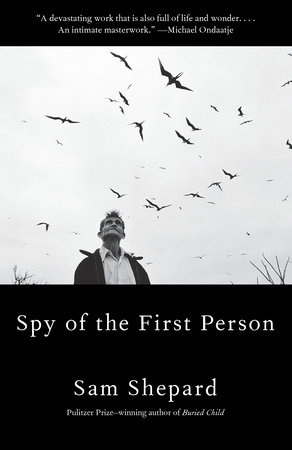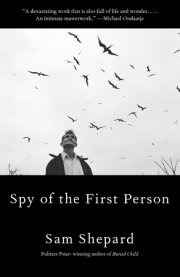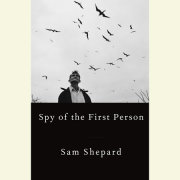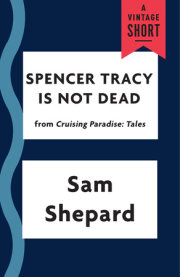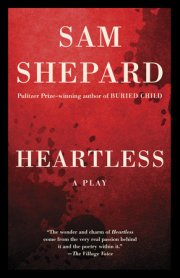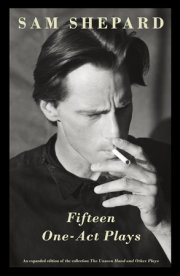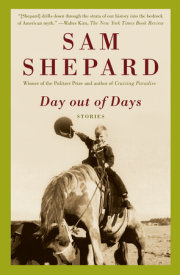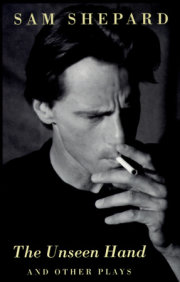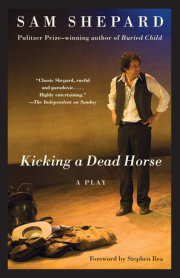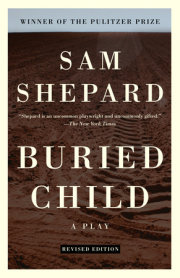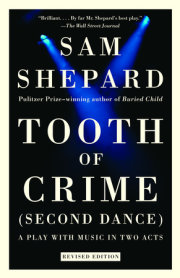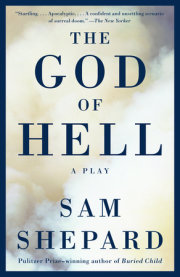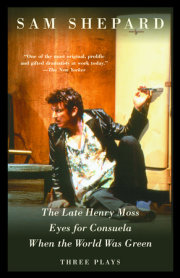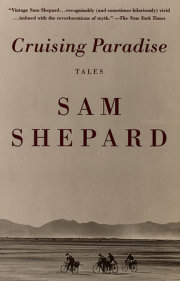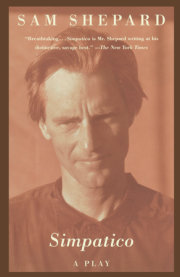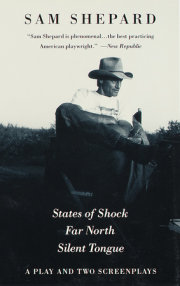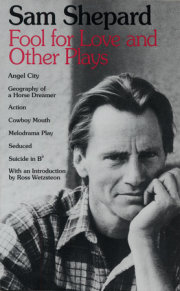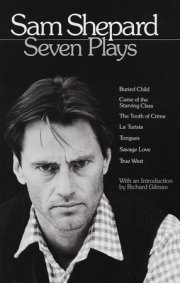1
Seen from a distance. That is, seeing from across the road, it’s hard to tell how old he is because of the wraparound screen porch. Because of his wraparound shades. Purple. Lone Ranger. Masked bandit. I don’t know what he’s protecting. He’s actually inside an enclosed screen porch with bugs buzzing, birds chirping, all kinds of summer things going on, on the outside—butterflies, wasps, etc.—but it’s very hard to tell from this distance exactly how old he is. The baseball cap, the grimy jeans, the old vest. He’s sitting in a rocking chair, as far as I can tell. A rocking chair that looks like it was lifted from a Cracker Barrel. In fact, it still has the broken security chain around one leg. I think from this distance it’s red but it could be black, the rocker, some of these colors originate from the Marines, some of them from the Army, some from the Air Force, depends on the depth of one’s patriotism, and he just rocks all day. That’s all. Telling stories of one kind or another, little histories. Battle stories. People come by, and they see him sitting there on the porch in his rocker mumbling to himself. And they just walk up and sit down. They seem to know him somehow. At first they seem as though they don’t, but then they do. Also there are other people who come by. Who come and go. One of them looks like it might be his son. Tall and lanky. One looks like it could be his daughter. Two of them look like they might be his sisters. They come and go from deep inside the house but it’s very hard to tell from this distance how deep the house goes.
Robins are chirping approval. More or less. Robins are always chirping here, for some reason. I think mostly protecting nests. Protecting pale blue eggs. From crows and blackbirds. Swooping. Menacing birds trying to get their babies. Little robins with red breasts chirping madly trying to scare away the crows. Big bad birds.
2
They gave me all these tests. Way out in the middle of the desert. The painted desert. Land of the Apache. Land of the Saguaro. They gave me blood tests, of course. All kinds of blood tests testing my white corpuscles, testing my red corpuscles, testing one against the other. Then they tested my spinal column. They gave me a spinal tap even. They put me through MRIs. Tubes where they could look at my whole body to see if there was any paralysis in any bones or muscles. Cross-sections, sliced sections. X-rays. Ghostly pictures. And they looked at decay and they looked at all kinds of things and they couldn’t come up with an answer until finally one guy, I think some kind of neurosurgeon, he had black hair and a white coat and glasses, electric probing shocks with a steel rod. He injected them into each arm and an electric current pulsed through and I could feel these shocks in my arms. He’s the one who came up with the answer that something was wrong. And I said, well, I know something is wrong. Why do you think I’m in here? He just looked at me with a blank stare.
In the mornings I would have breakfast at a Mexican joint. Enchiladas. Cheese and eggs. Green chili.
3
There used to be orchards as far as the eye could see. Like picture postcards. Orange orchards, olive orchards, grape orchards, avocado orchards, lemon orchards, pear orchards. Orchards of every kind corresponding to the nationality that brought them here. For instance, the Italians and the Spanish brought oranges, avocados—well, the avocados came up through Mexico—tangerines, grapefruit, those kinds of things. The Italians brought olives. Out through Padua, sweeping silver leaves, limbs gnarled like old sailors. Black bark, silvery leaves. There were oceans of olive orchards everywhere. Way up in Chico there were almond orchards. Almond orchards that turned white in spring. Beautiful almond orchards that looked like Japanese calligraphy. Gorgeous. Walnut groves. Palm trees out in the Indio desert. Tall. Really tall. Some of them 100 feet or more. There was a border town between California and Arizona. The Colorado River ran through it. It was 1953 and white men used to dress up as Arabs on camels and parade back and forth in the street wearing Shriner caps pretending to be full of Arab pride. They were guys from the Midwest who owned barber shops and drugstores and had thick glasses. They had never seen the desert. I used to ride in the back seat of a Chrysler, right past the Colorado River with my aunt, my great-aunt who had blue hair and she was Welsh and her husband was fairly wealthy, but he had died by that time. His name was Charlie Upton, from Liverpool. And he had a penchant for whiskey and barroom brawls. In one of these fights he had his ear bitten off. Mike Tyson style. Bit right in half so that he only had one half an ear on one side of his face. I forget which side that was. But anyhow, he was wealthy enough to buy a Chrysler sedan on the black market during the War. Big heavy car. Beautiful car. Good for the open road. It had plaid seats. Plaid, not any other color but red plaid. I was all alone in a sea of plaid. It had an armrest that folded down in the middle of the back seat and behind each of the front seats was a kind of cord that went across, I suppose to support yourself for getting in and out of the vehicle if you were old. I wasn’t that old then, maybe eight or nine, and my great-aunt who was my mother’s mother’s sister, her name was Grace and she had blue hair. She would drive me out there to Indio to the date festival where we would get date shakes and watch the white men pretend to be Arabs on camels parading back and forth in the heat. From the tops of the 100-foot palm trees you could see parrots peeking out. Red. Black. And green. Date shakes, imagine that.
There’s a place along the way that always made me feel peaceful and I don’t know why. There’s a wharf behind it. The wharf leads out to the Pacific. The wharf creaks and moans. Sometimes it chatters and thuds when cars cross it. The timbers rattle. Sand covers the sidewalk. Sand blown in from the beach. Surfers twelve years old or maybe thirteen carry their boards under their arms coming home in the twilight. Bermuda shorts on, hair all oily, covered in sand. Small dogs walk behind them. Small dogs of no significant breed. Pelicans cling to the wharf. Seagulls swoop. Sandpipers hum and sing and dance their little dance. The seaweed is soaking. Far in the distance two people are getting up from the beach just in bathing suits folding a huge orange towel. The squirrels are scurrying for cover. The sun is setting on the Pacific. People are unlocking their cars from a distance. Pushing buttons, zapping their cars, making the doors buzz and sing, making little Close Encounters of the Third Kind noises. People are getting in and starting their cars, driving out of the parking lot under the palm trees, past the lawns, past the glassed-in sitting rooms where blond women are serving them lobster. Somebody is turning off a lawn mower. Somebody’s sitting at a bus stop. Somebody’s waiting for somebody. Lights are coming on. They’re starting to serve dinner. They’re bringing steaming pots of something. Something like crab. Something like cod. Bowls full of cod. Bowls full of hot rice. People are going home. Somebody is waiting for somebody. Somebody’s waiting for a bus. Everybody’s waiting for somebody to take them out of there—to take them far away. Down below they’re just starting to swim and it’s not even really dark yet but they are starting. Old men starting to drink. Young women are smoking cigarettes. The boats are rocking back and forth, back and forth. Bells are chiming. Some boats are unloading nets. Nets full of octopus spilling on the wharf. Somebody’s waiting.
But inside this room they’re laying down plates full of oyster, plates full of lobster. Steaming fish and rice. They’re pouring huge glasses full of beer. Moving toward the windows, someone comments on the race. I do remember this. Someone says, “A horse has been shot. The leader. The lead horse has been shot. A jockey is down on the ground. There goes the morning line.”
4
I’m not normally a suspicious person. I don’t go around looking over my shoulder for surprises. But I have the sense—I can’t help having the sense—that someone is watching me. Someone wants to know something. Someone wants to know something about me that I don’t even know myself. I can feel him getting closer and closer. I can hear breathing. I can tell he’s male by the smell of his breath. I don’t know what he wants. He gets more and more curious about my comings and goings. About me. He seems to want to know something about my origins.
5
Where exactly do we come from? That’s one question. Was it a desert? Was it a forest? Was it a mountain? Was it the prairie? Where do we actually come from? The Colorado River?
If you were traveling in a foreign country and you lost your dogs and you lost your car and you lost your note from home that your mother pinned on your collar and you lost your clothes and you were standing there naked and somebody came up to you and said, where do you belong, how would you answer? Would you ask the one ancestor who happened to be Portuguese? Or would you ask the Spanish Armada? Somebody has forgotten.
6
To tell you the truth, I don’t know where he came from. I discovered him quite by accident. Bent backwards, gasping for air. One day I was sitting here much the same way as he’s sitting now, twiddling my thumbs, and I was looking out across the road and I saw this chair rocking back and forth and then I saw that somebody was in it. And there he was. He just appeared. I don’t know whether he rented or bought the house and then invited his people there or whether they were already there and he came to visit them or whether he’s on a short-term lease. I don’t know exactly. Sometimes people appear like that out of nowhere. They just appear and then they disappear. Very fast. Just like a photograph that emerges from a chemical bath.
7
I’m not sure what he’s seeing now, the air is so hazy, I’m not sure what I’m seeing either. Whether he’s talking to himself or talking to someone else or what exactly he’s doing. The birds are not singing now. Fluffy white clouds all around but the air is still hazy. The trees are coming back to life. A pair of old red tennis shoes dangles from the telephone wires, hanging up there by shredded laces.
He eats cheese and crackers all day. Iced tea. He sips on that. But he has particular trouble with his hands and arms, I’ve noticed. His hands and arms don’t work much. He uses his legs, his knees, his thighs, to bring his arms and hands to his face in order to be able to eat his cheese and crackers. It seems that periodically he has to go to the bathroom or something. He stands. He wavers when he stands. He looks like he’s going to fall over. Topple. It must be the reason for the handicapped sign hanging from the rearview mirror of his car in the driveway. He wavers from side to side. He signals. He looks like he might very well fall over, but he doesn’t. Sometimes he calls for one of his people—one of his sons or daughters or somebody else closely related to him like his sisters. He signals and they come out on the porch. In other words, he stands, he wavers, he does these things over and over again. Cheese and crackers, iced tea, reading. Then he calls somebody and they come and they tend to him. They take him inside the house. They take him by the arm and take him inside. He goes through a screen door into a dark house and disappears. There’s no telling how deep the house goes. When he comes back, often with the same person, arm in arm, they either zip him up or zip him down. They zip up his pants. In other words he’s done something very private. He’s either urinated or gone number two and they help him with this. They help put him back together and then they stick him back in his rocking chair. They sort of gently lower him back down even though at a certain point he kind of falls into the chair backwards panting and gasping. He says, the more helpless I get, the more remote I become. Am I seeing all of this? The air is still hazy. You might ask yourself why. Why am I so interested. Is it pure curiosity or do I have some other motive. For instance, hired by some cryptic detective agency. Or is everything by accident?
8
Why is he watching me? I can’t understand that. Nothing seems to be working now. Hands. Arms. Legs. Nothing. I just lie here. Waiting for someone to find me. I just look up at the sky. I can smell him close by.
9
It was that time of day that I love so much. That people have written songs about. The time of day when afternoon is turning to night. Twilight, I guess it’s called, and I snuck across the road. I snuck across the road hoping to get a peek at him before he began any conversation with somebody unseen or seen. I crossed the road. It had been raining for three days straight. Raining. The street was still running with water. Water was coming down everywhere. Not rain but residual water. I got to the other side through the parked cars, through all kinds of parked cars. There were Toyotas, there were Chevys, there were Fords, there were Zumbayas. All kinds of cars and I got to the hedge which was neither a camellia hedge or a hydrangea or anything like that. It was unidentifiable. There were white flowers coming out of it but I didn’t know quite what they were. I can make him out through the white flowers, through the hedge. But I wasn’t quite sure. I could make something out through there, but I wasn’t sure what. Oh never mind, I’ll figure it out later. That’s the thing about later. You don’t know what’s coming up. You don’t know how all the loose ends are going to gather together. Something for sure is going to happen but you don’t know what it is. For instance—I’m outside, for instance. Out here with the birds and the bugs. Not exactly outside, but close enough. Just across the way. It’s never like it was. The clouds. The big sky. The flowers. The chirping.
Copyright © 2017 by Sam Shepard. All rights reserved. No part of this excerpt may be reproduced or reprinted without permission in writing from the publisher.

